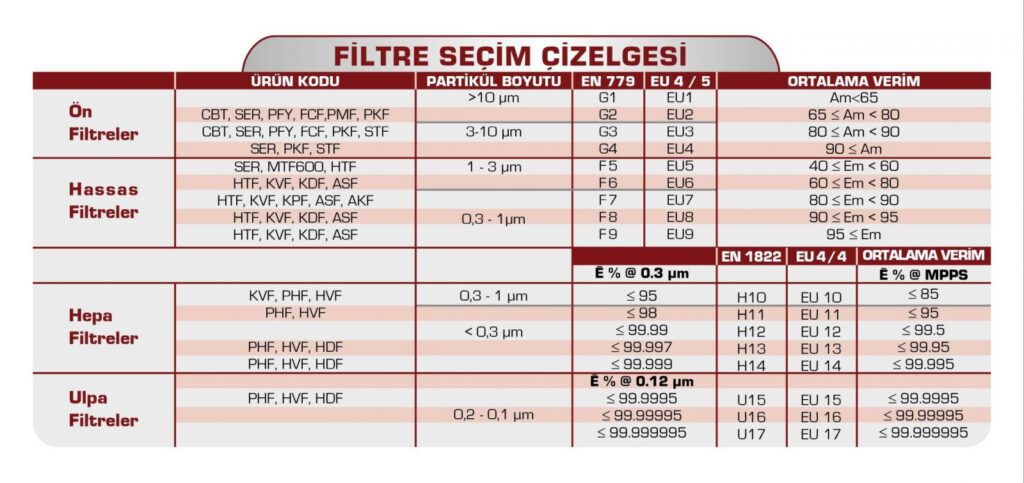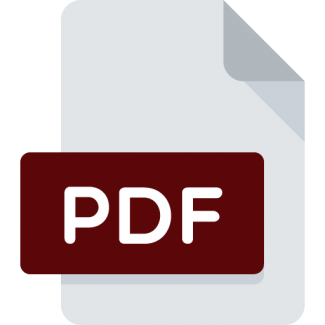Filter Selection
What are HEPA and ULPA filters?
HEPA stands for High Efficiency Particulate Arresting. It denotes high-efficiency particulate trapping. Hepa filters are the filters can that can eliminate particles down to 0.3 microns in proportions of 85% and above from the air. Filters that are more sensitive than Hepa filters are called ULPA filters which have a rate of 99.999%. HEPA and ULPA filters do not require  maintenance and made up of special fibers, and have a structure similar to paper. These filters have to be replaced with the new ones within a specific period of time. Replacement of HEPA and ULPA filters are recommended between 6 to 12 months depending on the air pollution of the ambient where they are used, frequency of employment and pressure loss. Currently, HEPA and ULPA filters are employed in operating rooms, hospitals and clean room applications due to the filtering performance, reliability and maintenance-free structure thereof. HEPA and ULPA filters have models with MDF, plastic or metal frames.
maintenance and made up of special fibers, and have a structure similar to paper. These filters have to be replaced with the new ones within a specific period of time. Replacement of HEPA and ULPA filters are recommended between 6 to 12 months depending on the air pollution of the ambient where they are used, frequency of employment and pressure loss. Currently, HEPA and ULPA filters are employed in operating rooms, hospitals and clean room applications due to the filtering performance, reliability and maintenance-free structure thereof. HEPA and ULPA filters have models with MDF, plastic or metal frames.
What is bag filter?
Bag filters, made of synthetic fiber material, have high dust holding capacity and superior performance. Bag filters are manufactured with 500 mm and 600 mm depths are manufactured with special dimensions. Synthetic fiber bag filters are utilized in air-conditioning systems. In hygienic air conditioning systems they are assembled in the air handling unit with a view to keep the large particles and protect the HEPA filters. Synthetic fiber bag filters perform filtration in the “G3 (EU4) – G4 (EU4) – F5 (EU5) – F6 (EU6) – F7 (F7) – F8 (EU8 ) – F9 (EU9)” classes.
What is activated carbon filter?
Active carbon filters have the ability to capture and keep gas molecules. The surface of the active carbon filter consists of millions of tiny pores. Odor-emitting toxic gases are captured thanks to cited pores. Activated carbon filters should be replaced depending on pollution of the media air where they are used and frequency of use. For example activated carbon filters should be replaced every 3 to 6 months, in a smoking environment. Activated granular carbon filters are used as odor eliminator filters in places where heavy odors occur. When the filter gets dirty in activated granular carbon filters only granular carbons are replaced. There is no need to change the cells of the filters.
What is Cassette Filter?
Cassette panel filters are made of specially blended fiber raw materials with controllable and renewable and have an extremely durable structure. The protection cage around it is placed with an eye to protect the filtering feature from impacts. Cartridge panel filters are “G2 (EU2) – G3 (EU3) – G4 (EU4) – F5 (EU5) “class filters. Cartridge filters are produced as cellulose based and fiber glass based.
“Alp filters”-table1.jpg
Am% : Average dust capture ratio for the prefilters in the “G1 – G4” class.
Em% : Average yield for precision filters in the “F5 – F9” class.
% : Average yield for hepa and ulpa filters in the “H10 – U17” class.
MPPS : Most penetrating particle size of the filter.
Which filter should I use?
Filter selection table hereinabove will help you in this regard. Furthermore, our technical support professionals will be glad to help your esteemed side if you reach us through our e-mail address alperen@alperen.com.tr or telephone number 0212 503 35 36 pbx
When should the filters be replaced?
The resistance that the filter shows against the airflow when it is clean is called initial resistance or pressure drop. The unit of pressure measurement incident to foregoing is called as Pa (Pascal) value. This value increases as the filters get dirty. The filters whose resistance value reaches the recommended final resistance must be replaced.
The last resistance values determined for prefilters and bag filters are recommended according to EN 779 European standards and you can examine these technical values on our website at www.alpfiltre.com.
What is the life of filters?
The answer to this question depends on the air pollution where the filters are installed. Factors such as elimination or addition of the air pollutants, and seasons have impact on the life of the filter.
Based on our experience we can say that the life of the cassette filters are 2 to 3 months while that of bag filters are 4 to 6 months and life of HEPA filters are 6 to 12 months.
Which filters are washable?
Prefilters that have polyurethane or metal internal structure are washable. Bag, HEPA and ULPA filters filter invisible particles by attracting and attaching them to the fibers of the filter on the basis of molecular attraction. These types of filters cannot be cleaned, repaired or replaced.
How can I find answers to my questions about the other filters?
Our technical support professionals will be glad to help your esteemed side incident to your technical questions as to the filters if you reach us through our e-mail address alperen@alperen.com.tr or telephone number 0212 503 35 36 pbx









 PRODUCT CATALOG
PRODUCT CATALOG